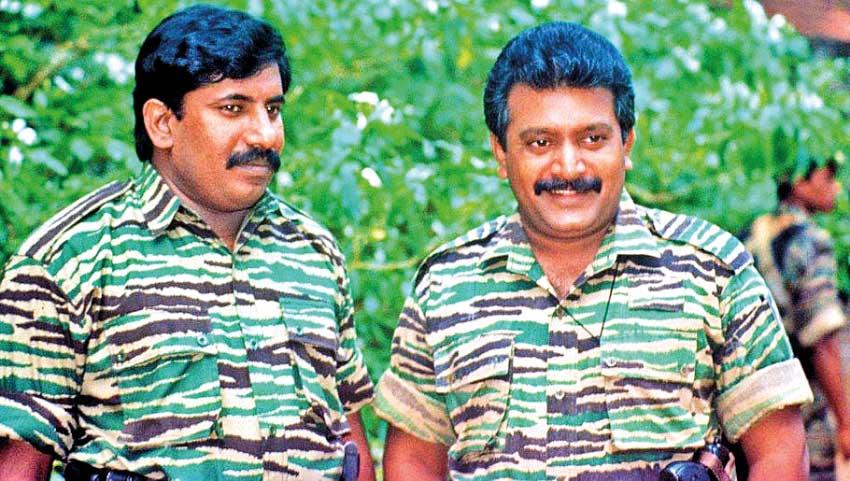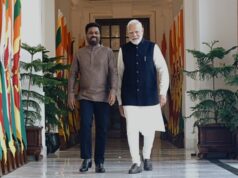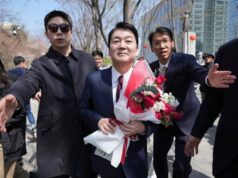Downfall and death of LTTE’s Mahathaya

By
D B S JEYARAJ
How Tiger Chief Prabhakaran got his No 2 arrested, interrogated and executed
The Liberation Tigers of Tamil Eelam (LTTE) ceased to exist as a functioning entity after its military defeat on the shores of Nandhikkadal lagoon in May 2009. The LTTE in its heyday was a very powerful politico-military organization that controlled extensive swathes of territory in the Northern and Eastern provinces of Sri Lanka. Covering the LTTE in those days was a huge bonanza for journalists as the activities of the Tigers – as they were widely known — provided a treasure trove of news stories and articles for members of the scribe tribe.
One of the most sensational happenings within the Tiger realm in those days was the downfall and consequent demise of the then LTTE deputy leader Gopalaswamy Mahendrarajah alias Mahathaya.
The popular and powerful Mahathaya had at one time been the trusted confidante and able No. 2 of LTTE Numero Uno Veluppillai Prabhakaran. However, Mahathaya fell foul of Prabhakaran at one point. This resulted in Mahathaya being arrested, detained and interrogated by the LTTE’s intelligence Chief Shanmugalingam Sivashankaran alias Pottu Ammaan in August 1993.
After being held captive for almost 16 months, Mahathaya was executed in December 1994 on charges of treason. It was alleged that Mahathaya had collaborated with the Indian espionage agency, Research and Analysis Wing (RAW) to assassinate Prabhakaran and several other top Tigers.
The arrest and detention of Mahathaya by the LTTE leadership on charges of treason for allegedly collaborating with India’s spy agency the RAW caused much excitement. It also evoked a sense of disbelief. There was much speculation as to whether Mahathaya had indeed conspired to assassinate Prabhakaran or not. Moreover, the fate of Mahathaya was unknown for a long time.
Prabha and Mahathaya
The Mahathaya affair shocked politically conscious Tamils globally when details became known gradually.
Until news of the break-up became known, Prabhakaran and Mahathaya had been perceived by many as being very close. Both Prabakaran and Mahathaya hailed from Valvettithurai (VVT), a coastal town in the Jaffna District and considered to be the hotbed of Tamil armed militancy.
They were of the same caste and also alumni of the Chidambara College, VVT. They were of the same age group, Prabhakaran being born in 1954 and Mahathaya in 1956. Sharing a common political objective, they had been in the same organisation for more than 15 years. Mahathaya was inducted into the movement by Prabakaran himself in 1976.
While Prabhakaran was the undisputed numero uno of the Tigers, Mahathya had been his acknowledged deputy.
Prabakaran was both the leader of the LTTE as well as its Military Chief. Mahathaya was its Deputy Leader and also the President of the defunct political party of the Tigers, the People’s Front of Liberation Tigers (PFLT).
The Mahathaya incident also resulted in the image of the LTTE as a monolithic organisation being seriously dented even if the structural fabric was not torn apart.
Fratricidal warfare between and within the various Tamil militant groups was not a new phenomenon. Inter-organisational warfare had seen a series of clashes between the LTTE and others like the Tamil Eelam Liberation Organisation (TELO), the Eelam People’s Revolutionary Liberation Front (EPRLF), the Eelam National Democratic Liberation Front (ENDLF) and the People’s Liberation Organisation of Tamil Eelam (PLOTE).
Intra-organisational differences among the militants had resulted in the Das-Bobby clash in the TELO, the Padmanabha-Devananda break-up in the EPRLF, the Shankar Raji-Balakumar split in the Eelam Revolutionary Organisation (EROS), and the various dissident groups of the PLOTE, led by Santhathiyar, Sivaneswaran, Paranthan Rajan and so on.
Whatever the differences within the LTTE, the Tigers, to their credit, had been able to project to the outsider a picture of impregnable unity until the Mahathaya affair.
Despite the rumblings of discontent that have arisen at various times within the LTTE, those sounds were never permitted to reach external ears. But now the publicity surrounding Mahathaya’s downfall had shattered that wall of silence. However, the Mahathaya matter did not fragment the LTTE at that time. A major split in the LTTE was to take place a decade later when the Tiger Eastern regional commander Vinayagamoorthy Muraleetharan alias Col. Karuna revolted in 2004.
Memories of the Mahathaya episode in Sri Lankan Tamil history were revived for me a few days ago when I renewed contact with an old Indian journalist friend after several decades.
We spent some hours reminiscing about the past. It was he who broached the topic of Mahathaya and referred to my experiences with the LTTE ex-deputy leader in the past.
Reminding me of my writings about Mahathaya, my friend urged me to write in detail again about Mahathaya.
Mahathaya Interview
My journalist friend was appreciative of the fact that it was I who had scooped the news about Mahathaya being arrested and detained by Prabhakaran.
Upon reflection, I realised that it was 35 years ago in late October 1987 that I was arrested by the Police for obtaining an interview with Mahathaya.
It is against this backdrop therefore that I re-visit the downfall and demise of Gopalaswamy Mahendrarajah alias Mahathaya in these columns.
At the outset of this article, I would like to state that Mahathaya was one of the senior LTTE leaders that I interacted closely in my professional capacity as a journalist in Sri Lanka. Some other Tiger leaders I knew well were Kittu, Yogi, Thilagar, Soosai and of course Anton Balasingham.
Likewise, I have also interacted with leaders of other militant organizations like Umamaheswaran, Manikkathasan and Vasudeva of PLOTE, Padmanabha, Suresh, Varatharajapperumal and Douglas Devananda of the then EPRLF, Sri Sabaratnam, Das and Mohan of the TELO and Balakumar and Para of the EROS.
The Mahathaya incident also resulted in the image of the LTTE as a monolithic organisation being seriously dented even if the structural fabric was not torn apart
At the Fourth Floor
Mahathaya was the indirect cause of my being arrested and detained by the CID on the infamous fourth floor for a few days in October 1987.
I was then the Colombo Correspondent of the Indian English daily The Hindu and also working at The Island newspaper. I was in Jaffna when the war broke out between the Indian army and the LTTE.
I returned to Colombo with first-hand news of the war and also a detailed interview with LTTE deputy leader Mahathaya.
The Sunday Island published the interview in full and the paper was sold out. On Monday I was arrested, detained at the Fourth Floor and interrogated about the Mahathaya interview and other related matters.
I may have been held indefinitely but for the intervention of my journalistic colleagues in Sri Lanka and abroad. groups to the Police headquarters demanding to see me.
They were not allowed to do so but those acts of solidarity had a great impact. Journalists in Tamil Nadu had demonstrations demanding my release.
N. Ram, then the Associate Editor of The Hindu came down to Colombo and interceded on my behalf with President J.R. Jayewardene.
Due to the efforts of Dr Neelan Tiruchelvam, the Bar Association of Sri Lanka also got involved. The then BASL Secretary Upali Gooneratne visited me on the Fourth Floor as my lawyer while BASL President H.L. de Silva prepared to file a petition seeking a Habeas Corpus writ on my behalf.
When President Jayewardene conducted a press conference in Colombo for the national and international media, my issue was raised by representatives of Western newspapers.
President Jayewardene then said I would be released on bail.
Thereafter, I was taken to court and released on bail. The Police said they needed time to investigate and find whether I had committed any offence by interviewing Mahathaya. My passport was also impounded.
There were several dates when Mr Upali Gooneratne represented me in court. Later the Police said my file had gone to the Attorney-General’s Department. After some more dates, the Attorney General cleared me of any wrongdoing.
I was discharged. This was how the Mahathaya interview enabled me to undergo new experiences in life.
Tamil Weekly in Toronto
The second noteworthy episode regarding Mahathaya and myself was when the LTTE deputy head fell out with the Tiger leader Prabhakaran.
I had then relocated to Canada and was editing a Tamil weekly Muncharie in Toronto. There were rumours then of trouble between Prabhakaran and Mahathaya but none of the newspapers in Sri Lanka or India published any report to that effect.
When some journalists asked Anton Balasingham, the LTTE political strategist told them “Off the record” that the LTTE had a practice of rotating the duties of senior leaders and that Mahathaya was now in charge of a highly classified Tiger project.
The hallmark of Muncharie the Tamil weekly that I was editing then was publishing news about what was happening in Sri Lanka. Canada is home to the largest number of Sri Lankan Tamils outside the Island. I first asked Lawrence Thilagar, the then International spokesman of the LTTE stationed in Paris about Mahathaya.
He echoed Balasingham and said Mahathaya was undertaking a confidential assignment and therefore adopting a low profile.
The arrest and detention of Mahathaya by the LTTE leadership on charges of treason for allegedly collaborating with India’s spy agency the RAW caused much excitement
I then began to gather information about what had really happened to Mahathaya.
Delving into happenings in Sri Lanka from Canada was a laborious exercise and an expensive process. I collated the details I had obtained and wrote a lengthy news story in Tamil about the arrest and detention of Mahathaya in Jaffna.
Before publishing it in the Muncharie I called Thilagar in Paris and asked him specifically whether Mahathaya had been arrested by Prabhakaran on charges of treason for collaborating with India’s RAW. Thilagar denied it vehemently.
I then went ahead and published the news story in full. It was a sensational story lapped up eagerly by readers.
Overt, Covert Reactions
There were two broad types of reactions. The overt type was denial. I was widely criticized and attacked by Tigerish elements for publishing false news and discrediting the Tigers.
Chief among my detractors was a prominent broadcaster in London, who behaved like the chief defender of the LTTE faith.
The second covert type of reaction was the questioning of LTTE functionaries in the Tamil Diaspora by supporters of the LTTE.
The LTTE network abroad was embarrassed. The story was also picked up by some Tamil journals in Tamil Nadu. This resulted in the LTTE hierarchy being questioned by some strong Tamil Nadu supporters.
The LTTE was compelled to come clean.
For the first time, the LTTE’s International Secretariat based in London issued a statement on New Year’s eve about allegations against Mahathaya, its one-time No. 2.
A subsequent statement to a Netherlands-based radio journalist by Anton Balasingham, the LTTE’s political adviser, said that apart from Mahathya, three others, including Yogi, the former head of the LTTE’s political wing, had been expelled from the organisation.
They were now being interrogated by the intelligence network TOSIS (Tiger Organisation Security Intelligence Service) headed by Pottu Amman.
I then contacted Lawrence Thilagar, the Paris-based international spokesperson of the LTTE by telephone again and asked him about Mahathaya.
He laughed loudly and said in Tamil “You have written everything and you are asking me now”. Thilagar, however, confirmed the expulsion of four persons from the LTTE for alleged involvement in a conspiracy to decimate the top-rung leadership of the Tigers, including its Supremo Prabakaran.
The gang of four, according to Thilagar, had allegedly collaborated with the operatives of the Indian Government’s Research and Analysis Wing (RAW).
Mahathaya, his chief bodyguard Suresh and another person code-named Engineer were in detention. Yogi was not being detained. But all four are being subjected to a rigorous inquiry tantamount to a trial, and a verdict of “revolutionary justice” was imminent said Thilagar. I was also commissioned by the Indian newsmagazine Frontline affiliated to The Hindu to write about the arrest and detention of Mahathaya. I also wrote an article on identical lines for The Island in Colombo.
Thus the Mahathaya story was broken by me in the English media also. I shall now rewind and narrate in detail how Mahathaya was arrested then.
Long Night -August 2/3 1993
The long night of August 2 and 3 1993 saw a swift, sharp, surgical strike by the LTTE. Only this time the target was the “enemy within”.
An undisclosed number of persons, estimated at over 300, were rounded up by the Tigers in various places. The exercise was supervised and coordinated by operatives of the LTTE intelligence wing TOSIS. Those arrested comprised serving LTTE cadres, ex-Tiger militants, helpers, supporters and so on.
There was an underlying thread. All were persons considered to be close associates or well-wishers of LTTE deputy leader Mahathaya. Many of them had either visited him or had been seen in his company in the recent past.
Those rounded up were taken to different locations and detained for interrogation.
The Tiger deputy chief Mahathaya too was taken into custody in the early hours of August 3, 1993. Initially, Mahathaya’s residence at Kopay was surrounded by three elite Tiger groups.
One was led by Balaraj, the then commander of the Charles Anthony Infantry Brigade; the second by Sornam, Chief of the Leopards Commando Unit; and the third by Soosai, special commander of the Sea Tigers Division.
The LTTE cadres accompanying the trio possessed much firepower including RPG launchers.
Apparently, they were prepared for an armed confrontation with Mahathaya and his bodyguards if Tiger No 2 resisted arrest. Such a confrontation did not occur because Mahathaya had given explicit orders to his bodyguards not to fight back if he was ever arrested.
Mahathaya had a security detail of 75 bodyguards then. 40 were stationed in Kokkuvil in the Jaffna peninsula and 35 at Vannivilaankulam in the Northern mainland known as the Vanni.
The operational headquarters for the LTTE deputy chief in Jaffna and Vanni were located then in Kokkuvil and Vannivilaankulam respectively.
When Mahathaya has arrested the bodyguards at his Kopay residence did nothing.
Nevertheless, they too were taken into custody. Also, the rest of the security detail at Kokkuvil and Vannivilaankulamtoo were arrested almost simultaneously.
Among those arrested in Vannivilaankulam was Mahathaya’s chief bodyguard known by the nom de guerre Suresh.
Balraj, Soosai & Sornam
After surrounding the residence and taking up positions, the top trio of Balraj, Soosai and Sornam stayed outside instead of going in. They sent two young boys to the house. It was Mahathaya’s wife Yogeswari alias Kalpana who opened the door when the young cadres rang the bell. Yogeswari, a native of Puthukkudiyiruppu, had been a member of the LTTE and was in the first batch of women to be trained in Tamil Nadu.
The boys told Yogeswari/Kalpana that the Thalaiver (LTTE leader Prabhakaran)wanted Mahathaya Annan to come at once.
She woke up her sleeping husband. When Mahathaya came, one of the boys speaking in a rude manner, asked Mahathaya to accompany them at once to meet the leader.
Mahathaya got angry and slapped the boy. Mahathaya said he will bathe, eat and come later and sent them away.
Within a few minutes, Balraj was at the door. Kandiah Balasegaram alias Balraj was a protegee of Mahathaya. He had been a member of the PLOTE earlier. But Mahathaya had recognized Balraj’s potential, drawn him into the LTTE and promoted him rapidly. Balraj was perceived as a Mahathaya loyalist within the LTTE then.
In later years Balraj was to demonstrate his worth by leading the LTTE to many military victories on the battlefront.
Balraj who rose to be deputy military commander of the LTTE died of illness in May 2008. Balaraj told Mahathaya that he along with Soosai and Sornam had come to escort him in a jeep to the leader personally.
Balraj requested Mahathaya to accompany them without delay. Realising that the situation was serious, Mahathaya complied with Balraj’s request. Mahathaya told his wife he would be back soon and left the house clad in a sarong, shirt and slippers.
He clambered aboard the vehicle along with Balaraj, Sornam and Soosai.
Yogeswari alias Kalpana
Mahathaya’s wife Yogeswari alias Kalpana, who herself was a former member of the Tigers women brigade, asked Balaraj where Mahathaya was being taken.
She was told that he was being escorted to Pottu Ammaan, the LTTE intelligence chief, on the orders of Prabakaran.
Later, Kalpana met Pottu Amman directly and inquired about Mahathaya.
She was told Mahathaya was being detained at Kalvayal, Chavakacheri and interrogated.
The investigation would take about six months and he could not be seen until that period was over.
As stated earlier Mahathaya had anticipated such a development and had clearly instructed his bodyguards not to offer any armed resistance if and when he was arrested.
While the trio consisting of Balaraj, Sornam and Soosai had come prepared for an armed confrontation, Mahathaya’s bodyguards did not fight.
But as mentioned earlier, they were also arrested and had their weapons confiscated.
After prolonged detention and intensive interrogation, many of the bodyguards were released intermittently.
But some including chief bodyguard Suresh were never released. Most of the released bodyguards were asked to resume duties as usual. But some reportedly refused to take back their weapons and expressed a desire to drop out of the movement. They were allowed to do so.
However, some of the released bodyguards as well as some other Mahathaya loyalists who had evaded arrest later surrendered to the Sri Lankan Army seeking protection.
Many of them were reportedly inducted as para-military operatives into military ranks.
lifting the veil of secrecy
The circumstances that led to Mahathaya’s arrest were for some time shrouded in mystery. It was LTTE Chief Prabhakaran who lifted this veil of secrecy. How and why that happened will be related in a forthcoming article.




